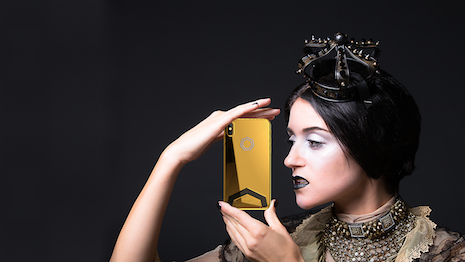 Michael Kors menswear. Image credit: Michael Kors
Michael Kors menswear. Image credit: Michael Kors
While luxury consumers today are generally showing a preference for experiences over things, affluent men tend to be more favorable towards trading up in tangible categories than their female counterparts.
During an Ipsos webinar on Jan. 23, an executive presented findings of the firm’s Global Affluent Study, which found that about two-thirds of consumers are skewed towards experiences, but 40 percent of men show an interest in physical merchandise. Along with this continued desire for material luxury, men also show more positive feelings towards premium and luxury goods, making them a key target for marketers.
“Men are more of the luxury lushes than women,” said Michael Baer, senior vice president and head of audience engagement at Ipsos. “And most significantly it’s the millennial men driving this data.
“Affluent men love luxury and they literally can’t get enough,” he said. “They unashamedly embrace luxury and they want more.”
Ipsos’ study surveyed affluent consumers with a household income of at least $125,000 in the fourth quarter of 2018.
Gilt meets guilt
Since the recession, luxury has been on an upwards trajectory. More than half of affluent consumers are primarily positive about the economic outlook, reflecting the performance of the stock market.
This positivity is also manifesting in consumers' luxury buying plans. About three-quarters of affluents buy luxury today, compared to an Ipsos survey conducted in 2016, when only 64 percent had shopped luxury.
Sixteen percent also plan to up their luxury spending this year, compared to just 9 percent in 2016. Consumers are most apt to trade up for electronics, but they also commonly buy luxury watches, jewelry, vacations, alcohol and cars.
 Brikk's iPhone X plays into the phone's luxury target. Image courtesy of Brikk
Those surveyed regard luxury as something that is not a necessity, but more of an excess that brings joy. Consumers also show a 63 percent preference towards experiences over things.
Ipsos looked at the difference that separates premium goods from luxury offerings. What it found was that consumers consider premium to be tied to tangible qualities, such as materials, while emotional characteristics drive luxury positioning.
Premium actually has more positive connotations for respondents than luxury does.
For affluent consumers, buying luxury often triggers mixed emotions of both enjoyment and guilt. Women are more apt to say they feel guilty than men are, and millennials show more guilt than older generations.
“It doesn’t mean that luxury is a dirty word,” Mr. Baer said. “It just means that the messaging needs to be more nuanced.”
For marketers, speaking to consumers about rewarding themselves or letting them know they deserve it can help to assuage guilt about buying upscale merchandise or experiences.
Demographic differences
Millennials differ from previous generations for attributes beyond their income levels. These consumers came of age during the recession, which has had an impact on how they approach luxury.
These shoppers show the highest rate of luxury guilt, with 67 percent saying they sometimes feel guilty, compared to an average 54 percent among those surveyed.
When Ipsos asked respondents to choose between a life well-lived and extreme wealth, millennials showed the greatest tendency towards picking wealth. However, only 16 percent chose bigger bank accounts over fulfillment.
Millennials are driving a number of trends in luxury, including sustainability. Three-quarters of this group are willing to pay more for socially conscious brands, compared to the total 55 percent.
Women are also contributing to the growth of sustainable luxury, with 62 percent interested in paying a premium for responsible brands.
Brikk's iPhone X plays into the phone's luxury target. Image courtesy of Brikk
Those surveyed regard luxury as something that is not a necessity, but more of an excess that brings joy. Consumers also show a 63 percent preference towards experiences over things.
Ipsos looked at the difference that separates premium goods from luxury offerings. What it found was that consumers consider premium to be tied to tangible qualities, such as materials, while emotional characteristics drive luxury positioning.
Premium actually has more positive connotations for respondents than luxury does.
For affluent consumers, buying luxury often triggers mixed emotions of both enjoyment and guilt. Women are more apt to say they feel guilty than men are, and millennials show more guilt than older generations.
“It doesn’t mean that luxury is a dirty word,” Mr. Baer said. “It just means that the messaging needs to be more nuanced.”
For marketers, speaking to consumers about rewarding themselves or letting them know they deserve it can help to assuage guilt about buying upscale merchandise or experiences.
Demographic differences
Millennials differ from previous generations for attributes beyond their income levels. These consumers came of age during the recession, which has had an impact on how they approach luxury.
These shoppers show the highest rate of luxury guilt, with 67 percent saying they sometimes feel guilty, compared to an average 54 percent among those surveyed.
When Ipsos asked respondents to choose between a life well-lived and extreme wealth, millennials showed the greatest tendency towards picking wealth. However, only 16 percent chose bigger bank accounts over fulfillment.
Millennials are driving a number of trends in luxury, including sustainability. Three-quarters of this group are willing to pay more for socially conscious brands, compared to the total 55 percent.
Women are also contributing to the growth of sustainable luxury, with 62 percent interested in paying a premium for responsible brands.
 Women are buying more into sustainable luxury. Image credit: Stella McCartney
Both women and millennials tend to search for product reviews to research a purchase.
Ipsos also found that women are more apt to buy for themselves than men are. Male luxury buyers are 20 percent more likely to buy products or experiences to share with others.
Men also show more fondness and pride in purchasing luxury than women. Among millennial men, 34 percent are planning to spend more on luxury in the coming year.
Male buyers additionally tend to choose premium products over mass options for everyday items, and are willing to trade up in almost every category.
Countering stereotypes about the buying behavior of men and women, new research finds that men today shop more frequently than women.
Per a study by First Insight, about one in five men shop six or more times at luxury department stores per month, compared to only 5 percent of women. As men shop more, luxury retailers need to find ways to reach out to these consumers in a crowded field (see story).
Changing business
Luxury is evolving, and half of consumers believe that it is different today than it was five years ago. The business has become more inclusive and democratized, which carries both positive and negative attitudes.
Today, consumers are less apt to define luxury by price, opening up opportunities for more affordable labels and goods. But how should brands approach the accessible luxury opportunity?
Post-recession, affluent consumers are more frugal than before, spending money more carefully and picking and choosing which categories to trade up or down in. Premium-priced brands are also putting pressure on traditional luxury houses, particularly as individuality and personal style become more important than having a specific status handbag or car (see story).
"It’s the emotive qualities that drive the luxury experience," Mr. Baer said. "On the other hand, premium is much more rational and tangible. But at the same time, it’s not necessarily luxury."
Women are buying more into sustainable luxury. Image credit: Stella McCartney
Both women and millennials tend to search for product reviews to research a purchase.
Ipsos also found that women are more apt to buy for themselves than men are. Male luxury buyers are 20 percent more likely to buy products or experiences to share with others.
Men also show more fondness and pride in purchasing luxury than women. Among millennial men, 34 percent are planning to spend more on luxury in the coming year.
Male buyers additionally tend to choose premium products over mass options for everyday items, and are willing to trade up in almost every category.
Countering stereotypes about the buying behavior of men and women, new research finds that men today shop more frequently than women.
Per a study by First Insight, about one in five men shop six or more times at luxury department stores per month, compared to only 5 percent of women. As men shop more, luxury retailers need to find ways to reach out to these consumers in a crowded field (see story).
Changing business
Luxury is evolving, and half of consumers believe that it is different today than it was five years ago. The business has become more inclusive and democratized, which carries both positive and negative attitudes.
Today, consumers are less apt to define luxury by price, opening up opportunities for more affordable labels and goods. But how should brands approach the accessible luxury opportunity?
Post-recession, affluent consumers are more frugal than before, spending money more carefully and picking and choosing which categories to trade up or down in. Premium-priced brands are also putting pressure on traditional luxury houses, particularly as individuality and personal style become more important than having a specific status handbag or car (see story).
"It’s the emotive qualities that drive the luxury experience," Mr. Baer said. "On the other hand, premium is much more rational and tangible. But at the same time, it’s not necessarily luxury."
